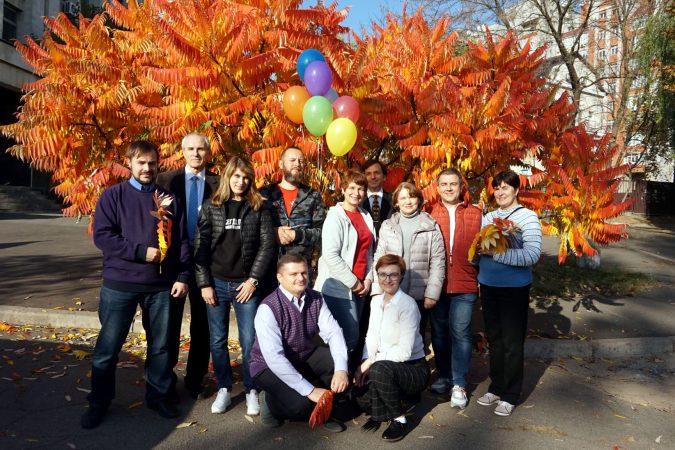URAN, Ukraine: A year under fire
Published: 30 March 2023
Text by Tetiana Preobrazhenska, URAN
English edition by Rosanna Norman, GÉANT

What challenges does an NREN face in a country where a war has been raging for more than a year? Is it possible to provide support to the Research and Education (R&E) community in such circumstances? We learn from the team of the Ukrainian NREN URAN Association about their experience of life and survival under fire.
Adjustment
On 24 February 2022, URAN colleagues as well as the whole of Ukraine woke up to the sound of explosions, and their lives changed forever.

“I overcame anxiety and confusion thanks to my loved ones, and my work”, Yevhenii Preobrazhenskyi, the executive director remembers. “Being the director, I had to take care of my colleagues’ physical and financial security, and of the stable provision of services to the research and education community of Ukraine. When you can do something for others, it gives meaning to your life and helps you move on”.
The URAN team had to adapt to new circumstances they had never experienced before. The adaptation process included two main elements that had to be carried out simultaneously: shift to remote working and move colleagues to safer places.
Employee safety was the priority. URAN’s team members have a strong bond and a close working relationship, from the first days of the war, they were in touch and supported each other daily. URAN management offered all employees help and relocation to safer regions in Ukraine or abroad. Numerous GÉANT colleagues offered support by inviting URAN employees to their homes with offers of shelter and work.
The second important part was changing the URAN mode of operation to a remote one. In Kyiv, URAN employees could not get to the office whilst the city was under fire, and although they had to completely switch to a remote working mode, it never prevented them from working for a day.
Supporting R&E in Ukraine
During the first months of the aggression, the URAN network was repeatedly damaged in areas of fierce fighting. Access to these sites was unreliable. Some of the equipment was lost, for example, in the then Russian-occupied city of Kherson in southern Ukraine, but URAN did not lose users there as university clients moved to western Ukraine, and URAN helped them set up in new locations. The number of relocated universities kept growing. In the new locations, they had nothing but bare rooms without any IT equipment. URAN supported them by delivering the available equipment and providing connectivity to the URAN network.
“New realities have created new needs for Ukrainian science and education”, Oleh Yurchenko, URAN system administrator, explains. “For example, the need to protect archives and data, as missile attacks occur everywhere throughout Ukraine and can lead to the destruction of servers and backup losses.”.

The GÉANT community helped to overcome this challenge. NORDUnet, an international collaboration between the NRENs in the Nordic countries, provided Ukrainian institutions with disk space abroad to back up their information
Also, the GÉANT Association and the OCRE project provided Ukrainian universities with the opportunity to deploy virtual machines for free at Amazon AWS and Microsoft Azure data centres in Europe. More than 20 universities and affiliated organisations took advantage of this opportunity and the process continues. By moving their IT infrastructure to the cloud, they gained the opportunity to continue to provide distance learning to their students.
The GÉANT community has supported URAN by launching a charitable initiative together with the Vietsch Foundation. Funds are donated by the European NRENs – and even personally by some of their employees. These funds are used to cover URAN’s operational costs for network support and will be used to replace network destroyed or lost equipment.
Electricity: the blood of networking
In autumn 2022 the country faced a new challenge. From October, Russia began systematically destroying Ukraine’s energy infrastructure with missiles and drones. As a result, not a single thermal or hydroelectric power plant in Ukraine was undamaged. At least 40% of Ukraine’s critical infrastructure was ruined, leading to unpredictable emergency blackouts lasting up to 20 hours per day.
In the first week, despite regular maintenance, URAN`s diesel generator broke down. The URAN main node was left without backup power, and during long unpredictable blackouts, services stopped being available to users.
“It was impossible to restore the generator due to the incredible dimensions of the problem throughout the country, service companies were overloaded with orders and had no spare parts. It also turned out to be impossible to buy a new generator – everything was sold out quickly” Yevhenii Preobrazhenskyi says.
In two weeks, the URAN technical team managed to repair the generator without any external support, and since then they have been steadily able to provide their services. Until March 2023, when the energy situation improved and power outages became less frequent, the team had to replenish fuel for the generator on a weekly basis and sometimes even twice a week. The average fuel consumption was 25 litres per day. In January 2023, URAN received an extra generator purchased with help of the Polish NREN PSNC, the GÉANT community and the Vietsch Foundation.
Current situation
URAN continues to support the R&E community of Ukraine providing them with digital services and access to high-speed GÉANT connectivity.
One of the tasks the team is currently working on, together with OCRE and EPAM partners, is the search for sponsors that can sustainably provide computing cloud services for Ukrainian universities. Leading commercial providers (for example, Microsoft Azure or Amazon Web Services) which have been providing Ukrainian universities with free access to their platforms since April 2022, are only able to continue this charitable support for a few more months, meaning that at the end of this period institutions will have to incur charges.
Another ongoing project that URAN is carrying out together with the UK NREN Jisc, aims to help sustain and rebuild Ukrainian universities participating in the UK-Ukraine Twinning Initiative. At this stage, Jisc is in the process of collecting, from UK universities, hardware resources that will be donated by URAN to twin universities.
Despite the dangers and instability caused by the war, URAN continues its operations and is even considering expanding its network by building new fibre channels to connect more R&E institutions.
“Today, I feel the impact of my work for Ukraine as never before”, Yevhenii Preobrazhenskyi admits. “This feeling is shared by all of us at URAN. The war has made us stronger”.